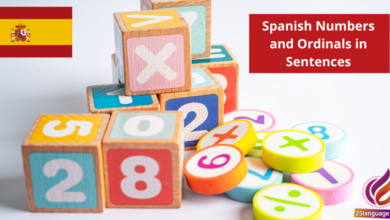spanish Grammar
Discover the intricacies of Spanish grammar in our comprehensive “Spanish Grammar” category. Here, you’ll find valuable resources, tips, and guides to help you master the rules of Spanish language structure, including verb conjugations, sentence formation, and punctuation. Whether you’re a beginner looking to build a solid foundation or an advanced learner aiming to refine your skills, our expertly crafted articles cover essential topics such as noun-adjective agreement, grammar tips for writing and speaking effectively, and common grammatical pitfalls to avoid. Enhance your understanding of Spanish grammar and boost your language proficiency with our engaging content, designed to support learners at all levels. Explore our rich collection of Spanish grammar resources today and take your language skills to the next level!
-

Spanish Conditional Sentences
In this lesson, we'll explore Spanish conditional sentences, or "si clauses." These structures allow you to express possibilities and hypothetical…
Read More » -

The Passive Voice in Spanish
Welcome to "The Passive Voice in Spanish"! In this lesson, you'll discover how to shift focus from the doer to…
Read More » -

How to Use the Future Perfect
Welcome to our lesson on the Future Perfect (Futuro Perfecto)! In Spanish, we use this tense to talk about actions…
Read More » -

How to Use the Past Perfect
Welcome to our lesson on the Past Perfect (Pluscuamperfecto)! This tense is used to describe actions that happened before another…
Read More » -

Spanish Indirect Speech and Reported Speech
In Spanish, indirect and reported speech involves changing the verb tense and pronouns when conveying what someone else has said.…
Read More » -

Spanish Prepositions with Countries and Cities
Welcome to today’s lesson on Spanish prepositions! In Spanish, we use "en" for cities and "a" for countries. For example,…
Read More » -

Spanish Prepositions of Place
In this lesson on Spanish prepositions of place, we'll explore words like "en" (in), "sobre" (on), and "bajo" (under). These…
Read More » -

Spanish Time Expressions Desde, Hace, Durante
In this lesson, we’ll explore key Spanish time expressions: "desde" (since), "hace" (ago), and "durante" (during). Discover how to express…
Read More » -

The Personal “A” in Spanish and When to Use It
In Spanish, the personal "a" is used before a direct object that refers to a specific person. For example, you…
Read More » -

Common Spanish Prepositions and Their Usage
Welcome to our lesson on common Spanish prepositions! These little words are key to expressing relationships and locations. For instance,…
Read More » -

Spanish Numbers and Ordinals in Sentences
In this lesson, we’ll explore Spanish numbers and ordinals! Numbers tell how much, while ordinals show position (like first, second,…
Read More » -

Spanish Colors and How to Use Them as Adjectives
Welcome to your Spanish colors lesson! In Spanish, colors are often used as adjectives and must agree in gender and…
Read More » -

Spanish Adverbs Formation and Placement
Welcome to our lesson on Spanish adverbs! Adverbs modify verbs, adjectives, or other adverbs, adding detail to your sentences. To…
Read More » -

Spanish Comparative and Superlative Forms
In this lesson, we'll explore Spanish comparatives and superlatives! To compare two things, use "más" (more) or "menos" (less). For…
Read More » -

Spanish Adjective Agreement and Placement
In Spanish, adjectives must agree in gender and number with the nouns they describe. For example, "el coche rojo" (the…
Read More »














